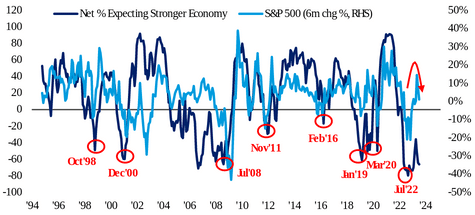By Vicki Schmelzer
NEW YORK (MaceNews) – Global investors dipped their toes back into equities in May but largely clung to bond and cash holdings, according to the findings of BofA Global Research’s monthly fund manager survey, released Wednesday.
Uncertainty about the health of the world economy and central banks’ ability to rein in inflation limited risk appetite and new positioning, the survey said.
This month, a net 65% of those polled looked for weaker economic growth in the coming year, vs. a net 63% in April and a net 51% in March. May’s reading is still well down from the record high of a net 79% last July at the peak of global growth concerns.
On the inflation front, this month a net 84% of fund managers looked for lower global CPI in the coming 12 months, unchanged from April and March. This is down from the record net 90% seen in December.
In terms of asset allocation, global investors pared back equity shorts while adding to their bond and cash long positions.
This month, a net 24% of portfolio managers were underweight global equities, compared to a net 29% in April and a net 27% underweight in March. This was the highest weighting of 2023, the survey said.
Last September, fund managers held a record 52% underweight in stocks.
A net 14% of managers were overweight bonds, the highest bond allocation since March 2009 and compared to a net 10% overweight in April and a net 1% overweight in March.
“Five of the last six months have seen overweight bond allocation, after a 14-year streak of underweight allocation,” BofA Global said.
Allocation to cash rose to a net 44% in May, up from a net 43% in April and a net 38% in March but still well down from the record net 62% overweight seen in September.
Average cash balances stood at 5.6% in May compared to 5.5% in April and March. Last October, average cash balances stood at 6.3%, which was the highest seen since April 2001.
In May, commodity allocation fell 11 percentage points to a net 2% overweight. This compared to a net 14% overweight in March.
On regional equity allocation, global investors showed renewed interest in eurozone assets at the expense of other regions.
Allocation to U.S. stocks stood at a net 39% underweight in May versus a net 34% underweight in April and a net 44% underweight in March.
This month, a net 4% of managers were overweight eurozone stocks, compared to a net 1% overweight in April and a net 19% overweight in March. This compared to a net 42% underweight last September, which was a record underweight.
Global investors pared back global emerging market holdings for a third month. Allocation to GEM stood at a 24% overweight in May versus a net 30% overweight in April and a net 37% overweight in March.
Allocation to Japanese equities stood at a net 11% underweight in May compared to a net 10% underweight in April, and UK allocation stood at a net 20% underweight this month, compared to a net 21% underweight in April.
In May, the biggest “tail risks” feared by managers were: “Bank credit crunch and global recession” (33% of those polled), “High inflation keeps central banks hawkish” (29%), “Geopolitics worsen (e.g. Russia/Ukraine, China/Taiwan) (15%), “Systemic credit event” (12%) and “U.S. debt ceiling” (8%)
In April, the biggest “tail risks” were: “Bank credit crunch and global recession” (35% of those polled), “High inflation keeps central banks hawkish” (34%), “Systemic credit event” (16%), and “Geopolitics worsen” (i.e. Russia/Ukraine, China/Taiwan) (11%),
In May, the “most crowded” trades deemed by global managers were” “Long Big Tech” (30% of those polled), “Short U.S. banks” (22%), “Short U.S. dollar” (16%), “Long European equities” (12%), “Long T-bills” 7% and “Long China equities” (6%).
In April, the “most crowded” trades were: “Long big tech stocks” (30% of those polled), “Short U.S. banks” (18%), “Long China Equities” (13%), “Short REITs” (12%), “Long European equities” (11%) and “Long U.S. dollar” (5%).
In terms of Federal Reserve expectations, 43% of global investors looked for the central bank to start an easing cycle in Q1 2024, while 24% say Q4 2023 and 14% say Q2 2024.
An overall total of 289 panelists, with $735 billion in assets under management, participated in the BofA Global Research fund manager survey, taken May 5-11, 2023. “251 participants with $666bn AUM responded to the Global FMS questions and 161 participants with $329bn AUM responded to the Regional FMS questions,” BofA Global said.
Contact this reporter: vicki@macenews.com
Stories may appear first on the Mace News premium service.
For real-time email delivery contact tony@macenews.com.
Twitter headlines @macenewsmacro

